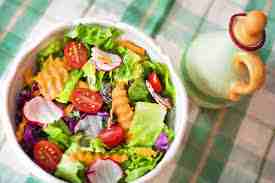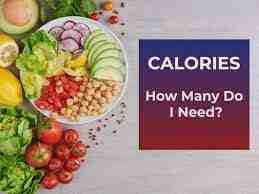A certain amount of calories a day can assist you in achieving and maintaining an ideal weight. Studies have also shown that in a balanced diet, eating the right amount of calories you require will also improve the health of your body and enhance longevity.1
To determine how many calories to eat daily, it is helpful to begin by understanding the suggested calorie intakes. After that, look at other aspects to determine the appropriate calorie consumption to suit your body’s health goals and your personal preferences. What you should know to know about your daily calorie intake.
What are the calories?
Calories measure the amount of energy food and drinks have in them. The quantity of energy you require will be contingent on the following factors:
- Your age, for instance, adolescents and growing children, might require more incredible energy
- Your lifestyle, for example, your level of activity
- Your size and weight could affect the speed at which you consume energy
The other factors that influence the amount of energy you use. Examples:
- Certain hormones (chemicals made by our bodies) include thyroid hormones
- Certain medicines, for instance, glucocorticoids, which are a kind of steroid to manage inflammation
- being unwell
How many calories do you need?
The general rule is to eat around 2000 calories, while males consume approximately 2500 calories daily. Most people find that having a diet of 2000-2500 calories can help keep a healthy weight.
It is possible to vary depending on body weight, height, age, and metabolic rate of your particular. For a better understanding of your specific needs, you can use our calculator below to determine how many calories you require to maintain your weight.
How Many Calories Should I Eat per Day?

For weight maintenance, the chart below shows your daily calorie limit. Based on physical activity, age, and your BMI (body mass index) of 21.6 for females and 22.1 for males. Adults, the man considered the reference figure, is 5 feet 10 inches tall and weighs 154 lbs. The female reference figure is 5 4 inches taller and weighs 126 pounds.
Lose weight. In the past, it was advised that to shed 1 pound a week, you’d have to reduce your total calories by 500 per day. Researchers now believe that losing weight is slower and that consistency and establishing achievable goals will help you achieve weight loss over time. The most important thing is to be patient and consult the dietitian to determine the best plan for your needs.
For weight loss is best to begin working to develop a program in conjunction with a dietetics professional. You can add calories, but do it in moderation.
To achieve weight loss is maintained over time, experts suggest choosing meals that have fewer calories but are high in protein, vitamins, minerals, fiber, and other essential nutrients.
Factors That Affect How Many Calories You Should Eat
According to the recommended intake of calories, guidelines indicate the number of calories required daily can differ based on a myriad of variables. The most important are 4.
- Sex
- Height
- Weight
- Age
- Level of activity
Other factors that could impact the number of calories your body needs to fuel itself, affecting the amount you consume, include hormones, medication (such as steroids and diabetes medications), and your overall well-being.
Using Weight Loss Calculators
Whatever your objective is to shed pounds, increase, or maintain your weight, the online calculator (or an app for calculating calories) will aid. It uses your weight, sex, height, and age to calculate how many calories you require to sustain your body’s needs to perform your daily activities.
It then adds up the calories required to increase or subtracts the calories needed to reduce weight. It can determine the calories you need to consume to maintain your weight.
Ensuring you input accurate data can assist in determining the calorific requirements of your day. If you need clarification on the activity level in your day, record an exercise journal over a week or review information from your fitness tracker for an idea of your daily calorific needs.
The calculator will then inquire about your objectives. You must be honest during this process. Set feasible goals. When you have achieved your goals, you may make a fresh one.
If you want to shed weight, a safe weight loss is 0.5 up to two pounds each week. If you want to increase your weight, adding one to two pounds each week is an ideal goal.
Calories in Common Foods

Below is a summary of everyday food items and their approximate calorie count for each based on 100-gram portions of FoodData Central. U.S. Food Data Central, a service of the Department of Agriculture (USDA) FoodData Central:
- Apple (red delicious) – 60 calories
- Broccoli – 35 calories
- The chicken breast (skinless) is 160 calories
- Grapes (red) – 81 calories
- Orange (navel) – 50 calories
- Pickles – 13 calories
- Rice (brown) – 366 calories
- Sweet potato (skinless) – 78 calories
- Tomato (Roma) – 20 calories
- Tuna (canned) – 87 calories
How many calories do you need to take in to get your breakfast?
Eating 15 to 20 percent of your daily calories is recommended to shed weight. Breakfast.
In a 1500-calorie diet, it would mean 250-300 calories. If you’re on a calorific diet, you should consume between 300 and 400 calories at breakfast.
The breakfast you consume is crucial to reaching your daily calorie targets for the remainder of the day.
At night your body’s and blood sugar levels are receiving an adjustment from eating less throughout the evening. Breakfast allows you to begin your day in how you would like to go on.
If you consume a high-sugar meal, your blood sugar levels will rise—the feeling of fullness and energy. But your sugar levels will likely drop and rebound by the time you get up. The spike in blood sugar levels, as well as the subsequent crash in blood sugar levels and next hunger, make you feel hungry mid to late early in the morning.
What should you have your breakfast?
Beware of eating processed grains with a high amount of sugar and fruits high in sugar, i.e., All fruit except fruit.
Pick a mix of meals that will maximize your intake of nutrients.
Try to find foods that:
- Natural fats, including cheese, yogurt, eggs, and avocado, are abundant.
- Naturally slow-releasing carbs like wholemeal bread.
- Low in sugar, like berries
- Natural fats and slow-releasing carbs will keep you fuller throughout the day. To learn more about fats, check out how many grams of fat are needed daily to lose weight.
What to Know About Nutrition
You can eat anything you’d like and shed weight if you remain within the calorie limit. However, maintaining this category could not be easy if you do not consume healthy foods.
Additionally, food that is low in calories doesn’t give your body the essential nutrients needed to lead a healthy lifestyle. If you consume food that isn’t nutritious are likely to feel craving food more frequently and eat more. However, eating healthy food can make you feel strong, energized, satisfied, and rejuvenated.
In addition, it is essential to note that not all calories are made to be equal. Foods rich in nutrients make you feel fuller for longer, boost your day-to-day activities, and boost your overall health. The empty calories may make you thirsty, increase your appetite for food, and make you tired. They are often found in processed foods that are loaded with added sugars, trans fats excessive fats, trans fats, as well as calories. These foods may give you energy, but they don’t provide the nutrients, such as vitamins and minerals, that you require.
The Best Online Calorie Counters
Many websites track calories, and online tracking apps are available to all. A few of the benefits offered by such apps include the ability to scan barcodes on food items for easy entry of your food items, compatibility with various tools or apps for health, and social support functions for the community.
The goal you set will determine what you intend to do with the progress you make and whether or not you’re looking to shed weight, gain or maintain the weight you are currently at; talk with your physician or certified dietitian for advice on the most effective route for you, and whether a calorie counter could aid.
